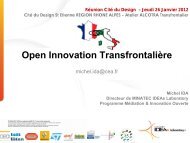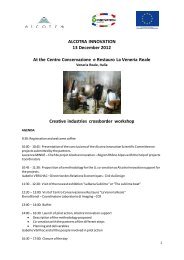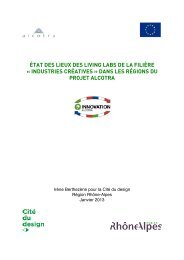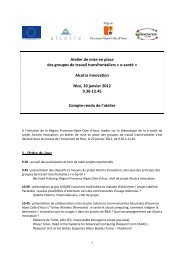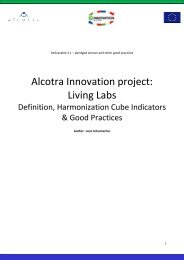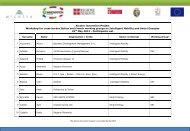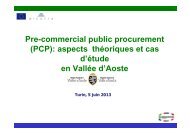Best practices Database for Living Labs - ALCOTRA - Innovation
Best practices Database for Living Labs - ALCOTRA - Innovation
Best practices Database for Living Labs - ALCOTRA - Innovation
Create successful ePaper yourself
Turn your PDF publications into a flip-book with our unique Google optimized e-Paper software.
• Openness: the innovation process should be gathering of many perspectives and bringing<br />
enough power to achieve rapid progress is important. The open process also makes it possible<br />
to support the process of user-driven innovation, including users wherever and whoever they<br />
are. The open process is demonstrated by the continuous interactions among the involved<br />
stakeholders, with special attention to the users. This means that multiple stakeholders and<br />
perspectives should be one key characteristic of a <strong>Living</strong> Lab, and can be implemented with<br />
project-teams consisting of people from academia, private companies, public organisations,<br />
and potential end user groups.<br />
• Realism: to generate results that are valid <strong>for</strong> real markets, it is necessary to facilitate as<br />
realistic use situations and behaviour as possible. This principle also is relevant since focusing<br />
on real users, in real-life situations, is what distinguishes <strong>Living</strong> <strong>Labs</strong> from other kinds of open<br />
co-creation environments.<br />
• Empowerment of users: the engagement of users is fundamental in order to bring the<br />
innovation process in a desired direction based on human needs and desires. <strong>Living</strong> <strong>Labs</strong><br />
efficiency is based on the creative power of user communities; hence, it becomes important to<br />
base innovations on people needs and desires, as well as to motivate and empower the users to<br />
engage in these processes. Needs and suggestions, priorities and requirements, collected<br />
through focus-group interviews, open source communities and prototype tests should be<br />
considered seriously and implemented as functions and features in the solution design.<br />
• Spontaneity: in order to succeed with new innovations, it is important to inspire usage, meet<br />
personal desires, and both fit and contribute to societal and social needs. Here, it becomes<br />
important to have the ability to detect, aggregate, and analyse spontaneous users’ reactions<br />
and ideas over time.<br />
4. Survey Results<br />
This section provides the preliminary results of a qualitative survey carried out on all the 274 <strong>Living</strong> <strong>Labs</strong><br />
that are currently members of the ENoLL, based on textual in<strong>for</strong>mation kindly made available by the ENoLL<br />
aisbl chair. The survey was carried out, when available, on the individual self-descriptions delivered by the<br />
candidates to the various ENoLL “waves”, otherwise on the <strong>Living</strong> Lab profiles that are published on the<br />
www.openlivinglabs.eu website. The results presented are only in aggregate <strong>for</strong>m (i.e. clustered by country,<br />
maturity, thematic domain, nature of the leading organization), to avoid the risk of disclosure <strong>for</strong> any<br />
confidential or simply personal data. However, Annex A and B provide the full listing of ENoLL members as<br />
well as the profiles of those <strong>Living</strong> <strong>Labs</strong> that are coming from the Alcotra <strong>Innovation</strong> regions. These Annexes<br />
only use public in<strong>for</strong>mation, available from the ENoLL website or confirmed by other independent sources<br />
(especially the respective <strong>Living</strong> Lab websites).<br />
4.1 Country Clusters<br />
Following is the list of the countries represented, at the moment, by at least one ENoLL member.<br />
The project is co-funded by the ERDF<br />
Page 25 of 78



